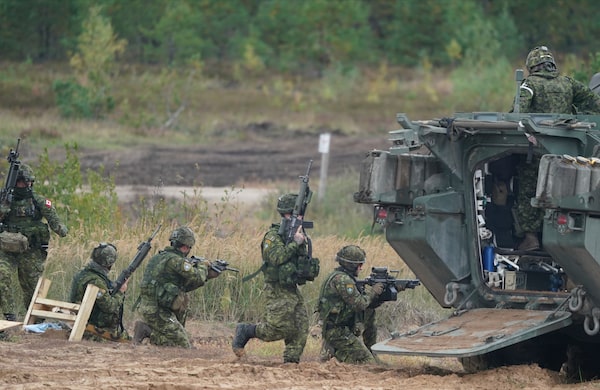
Canadian soldiers attend NATO military exercises at a training ground in Kadaga, Latvia, on Sept. 13, 2021.Roman Koksarov/The Associated Press
Defence Minister Anita Anand said she’s taking the question of whether to bolster and extend Canada’s 600-troop deployment in the Baltics to the federal cabinet.
She said this is part of a discussion about increasing Canada’s military commitment to Eastern Europe.
“We are considering how to strengthen our commitments to the Baltics and NATO’s eastern flank. That is an issue I am discussing with my colleagues both inside and outside the government,” Ms. Anand said in an interview in Riga, Latvia, where she is wrapping up a multiday trip to the region.
Canada’s five-year commitment to lead a multinational NATO battle group in Latvia lasts until March, 2023. It’s part of a broader North Atlantic Treaty Organization effort begun in 2017 as a check on further Russian aggression after Moscow annexed Crimea.
Ms. Anand didn’t say when a decision might be taken.
The U.S announced Wednesday it is sending 3,000 troops to Romania, Poland and Germany in response to fears that Russian President Vladimir Putin is planning to invade neighbouring Ukraine. The Baltic states – Latvia, Lithuania and Estonia – fear they may be next on the menu for Moscow.
Prime Minister Justin Trudeau’s government is still facing calls to send offensive weapons to Ukraine after it opted recently to send only non-lethal equipment.
So far about 5,000 Canadian soldiers have rotated through Latvia in what is currently this country’s biggest deployment.
Ottawa is facing calls from Riga to not only prolong its deployment there but to provide military aid for Latvia’s defence.
Baltics on edge as Russia menaces Ukraine
Canadian-led battlegroup ‘on front line’ with Russia in NATO’s defence of Baltics
Ms. Anand on Thursday finishes a tour that began in Ukraine early this week and took her to NATO headquarters in Brussels and then to Latvia, where Canada plays a big role.
She said she’s been gathering information during this tour that will inform the decision on the future of Canada’s Baltic commitment.
“My purpose here is to reiterate the message, bring back information and make sure we’ve had the face-to-face conversations that are necessary when you are making large decisions related to defence spending,” she said.
“I will take the information that I have gleaned back to Canada to discuss with the Prime Minister and with cabinet.”
A major concern for the Baltic states right now is a buildup of Russian troops in Belarus, a close ally of Moscow’s that borders Latvia, Lithuania and Poland. The BBC reported last week that an estimated 30,000 Russian soldiers are in Belarus for what Minsk and Moscow say are military exercises.
Belarus, which is increasingly considered to be under Russia’s control, offers Moscow a rapid staging ground from which to move on the Baltics or seize a land corridor to join Belarusian territory with the Russian exclave of Kaliningrad on the Baltic Sea.
Latvia’s Deputy Prime Minister Artis Pabriks last week said his country feels Russia’s renewed menacing of Ukraine demonstrates why NATO allies must continue the special deployment across the Baltics and Poland. “We hope this presence will be extended as long as it’s needed for us,” Mr. Pabriks, who is also his country’s Defence Minister, told The Globe and Mail.
Mr. Pabriks and Prime Minister Krisjanis Karins are pitching Latvia’s parliament on raising military spending to 2.5 per cent of annual economic output from a 2.3-per-cent target. Latvia, with a population of 1.9 million, is spending about $1-billon on defence in 2022.
But Mr. Pabriks said Latvia can’t properly equip itself alone so he’s been calling U.S. politicians. He said he would also like help from Canada, among others, if possible.
Earlier this week Ms. Anand announced Canada was extending and boosting a military training mission in Ukraine for another two years and with additional resources to double soldiers deployed to 400 from 200.
She said there should be no question about Canada’s willingness to defend Eastern Europe. “We are very much committed to NATO’s eastern flank,” the Defence Minister said.
“There is universal appreciation for Canada’s role in NATO, in Ukraine and in the Baltic states and that is a very important piece of our NATO commitment and our commitment to the rules-based international order.”
Roland Paris, a former foreign policy adviser to Mr. Trudeau, urged Canada and its allies to offer additional support to reinforce the defences of Eastern European and Baltic members of NATO.
“Mr. Putin needs to know that the more threatening his behaviour becomes, the more NATO will take measures to ensure the security of all of its members,” Mr. Paris, a professor of international affairs at the University of Ottawa, said.
Our Morning Update and Evening Update newsletters are written by Globe editors, giving you a concise summary of the day’s most important headlines. Sign up today.
 Steven Chase
Steven Chase